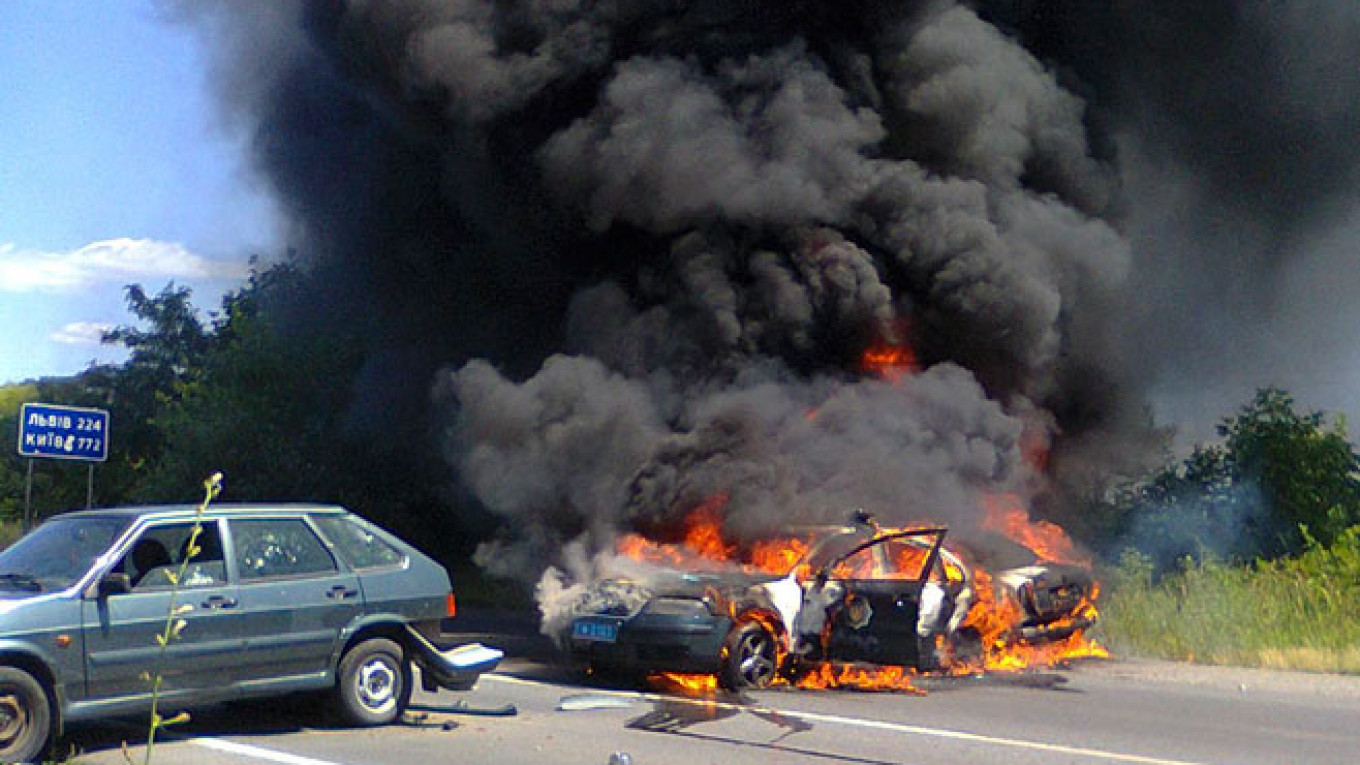At least two people were killed Saturday in a gun and grenade attack in the city of Mukachevo involving the country’s notorious nationalist militia Right Sector.
Police had surrounded some gunmen in a wooded area of the city and were trying to negotiate their peaceful surrender, a statement from the regional prosecutor’s office said. But details of the violence remained confused.
The prosecutor’s statement said about 20 armed people bearing Right Sector insignia surfaced in the early afternoon and called for a meeting with local residents at a cafe. They then began shooting, the statement said.
Ukrainian news reports earlier said that the violence broke out at a sports facility reportedly controlled by a national parliament member from a faction opposed to the Right Sector. It wasn’t clear whether the cafe referred to by the prosecutor’s statement was part of that facility.
The sports complex is connected to a national parliament member from a faction strongly opposed to the Right Sector, said Anton Gerashchenko, an adviser to the Interior Ministry.
A Right Sector statement reported by Ukrainian news media said two of the militia’s members had been killed. But Gerashchenko said three were killed and that three policemen and four civilians were wounded. He also said the attackers destroyed two police cars with grenade launchers.
The Right Sector statement said its members were attacked by “bandits” connected to Mikhail Lano, who reportedly controlled the sports facility, which local media said includes a gym and swimming pool.
Reacting to the news Saturday, Konstantin Dolgov, the Russian Foreign Ministry’s special representative on human rights, tweeted: “The Right Sector has shown its gangster face again [now] in Mukachevo. People in Kiev still can’t get rid of neo-Nazis and are trying to co-opt it instead, but soon it will be too late.”
Meanwhile, officials in Kiev were quick to bite back, pointing the finger at Moscow. “I don’t exclude the presence of Russian traces in the incident … as this region is in the zone of interest for Russian special services,” Irina Friz, a member of Ukrainian President Petro Poroshenko’s bloc, said on Facebook.
Following the incident, Poroshenko ordered the disarmament of the Right Sector, but the group vowed to resist, and to launch protests.
Up to 100 Right Sector protesters turned out Sunday in Kharkiv to rally on behalf of the group, Interfax reported from the scene.
Similar rallies were launched in Lviv, Dnipropetrovsk and Kiev, where protesters flocked to the presidential administration building.
The Right Sector played a prominent role in the anti-government protests that led to the ouster of formerly pro-Kremlin President Viktor Yanukovych, ultimately bringing pro-Western leaders into power in Ukraine. Right Sector activists were considered at the time to be some of the most radical and yet most meticulously organized of the protesters.
Following the uprising, the organization was transformed into a political party, but held tight to some of its more militant roots. Frequent efforts by the new Ukrainian government to persuade the group to disarm have been unsuccessful.
In November 2014, Russia’s Supreme Court declared the organization extremist and banned its activities in the country. Russian officials have often cited the Right Sector as evidence of a looming neo-Nazi threat in Ukraine.
The Right Sector has proven largely unpopular among Ukrainian voters, having garnered only 1.8 percent of the national vote in the 2014 parliamentary elections. The organization’s leader Dmytro Yarosh was elected in one of the 225 electoral districts.
Volunteer battalions associated with the Right Sector have been fighting alongside Ukrainian government forces against pro-Russian separatists in the country’s turbulent east. Its most infamous battalion, the Azov battalion, is based in the southeastern port of Mariupol and is known for its members’ militant nationalism.
A Message from The Moscow Times:
Dear readers,
We are facing unprecedented challenges. Russia's Prosecutor General's Office has designated The Moscow Times as an "undesirable" organization, criminalizing our work and putting our staff at risk of prosecution. This follows our earlier unjust labeling as a "foreign agent."
These actions are direct attempts to silence independent journalism in Russia. The authorities claim our work "discredits the decisions of the Russian leadership." We see things differently: we strive to provide accurate, unbiased reporting on Russia.
We, the journalists of The Moscow Times, refuse to be silenced. But to continue our work, we need your help.
Your support, no matter how small, makes a world of difference. If you can, please support us monthly starting from just $2. It's quick to set up, and every contribution makes a significant impact.
By supporting The Moscow Times, you're defending open, independent journalism in the face of repression. Thank you for standing with us.
Remind me later.






